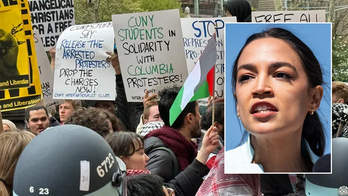DES MOINES, Iowa – DES MOINES, Iowa -- Republicans voters appeared to outnumber Democrats on Tuesday in primary elections that will settle contests for governor, U.S. Senate and in several congressional districts.
Secretary of State Michael Mauro, Iowa's top election official, predicted a Republican turnout of 150,000, with just over 100,000 Democrats voting.
There are more than 2 million registered voters in Iowa, and Democrats hold a roughly 100,000 voter edge over Republicans.
Mauro credited the governor's race and some congressional contests for the greater number of Republican voters.
"We obviously know that more Republicans are going to vote than we have Democrats," Mauro said.
The three-way race for the Republican gubernatorial nomination has drawn plenty of attention for months, as former Gov. Terry Branstad seeks a return to the office he held for four terms. He's running against Sioux City businessman Bob Vander Plaats and state Rep. Rod Roberts of Carroll.
The race has drawn a flurry of endorsements, from actor Chuck Norris to former Iowa Gov. Robert Ray and vice presidential candidate Sarah Palin.
Nancy Bunker, 60, a real estate broker from the Des Moines suburb of Windsor Heights, said she was voting for Branstad but that the endorsements didn't mean much to her, especially Palin's support for the former governor.
"I don't care about Sarah Palin," said Bunker.
Although the Republican races were drawing more voters, Mark Conley, 48, a Democratic marketing consultant from Windsor Heights, said he felt obligated to cast a ballot.
"I always try to involve myself in the process," Conley said. "I want my voice to be heard."
The Republican gubernatorial primary has been hotly contested and could indicate the direction of the party in Iowa.
Branstad has campaigned largely as a pragmatist, arguing he has the best shot of ousting Democratic Gov. Chet Culver. He's focused on economic matters and glossed over emotional social issues, such as abortion and gay marriage.
That has prompted some conservatives, most notably leaders of the influential Iowa Family Policy Center, to threaten to sit out the general election if Branstad is the Republican nominee.
Vander Plaats has tried to appeal to social and religious conservatives by concentrating on gay marriage, an issue that soared to prominence last year after the Iowa Supreme Court ruled that a ban on same-sex unions violated the state constitution.
Vander Plaats has repeatedly said he'd sign an executive order on his first day in office that would set aside the court's decision, a move many argue would be illegal. Vander Plaats also has stressed the need for a public vote to overturn the decision and has called for ousting the justices who unanimously made the ruling.
Roberts has taken a less confrontational stand, saying he opposes gay marriage and supports referring a constitutional ban to voters but thinks an executive order wouldn't stand.
Although some have criticized Vander Plaats for his approach, it helped gain him the endorsement of conservative icon James Dobson and Vander Plaats stuck to his view as Election Day approached.
"Vote for someone who represents you," Vander Plaats said. "Vote for someone who is an authentic conservative."
In the race for the Democrats' U.S. Senate nomination, Des Moines lawyer Roxanne Conlin has long been considered the prohibitive favorite over former legislators Tom Fiegen and Bob Krause thanks to name recognition and fundraising ability. She ran unsuccessfully for governor in 1982 and has been involved in Democratic politics for years.
Conlin was U.S. attorney before running for governor. After losing that race, she built a career as a trial lawyer and became the first woman president of the American Trial Lawyers Association.
Fiegen, of Clarence, was in the state Senate from 2001 to 2003. He works as a bankruptcy lawyer specializing in farms and small businesses.
Krause, 60, of Fairfield, was in the state House in the 1970s, leaving in 1978 for an unsuccessful run for state treasurer. He later worked as a manager for the federal and state transportation departments.
Two congressional primaries also have drawn attention, with four Republicans competing in the 2nd District to face Democratic Rep. Dave Loebsack and seven Republicans jostling in the 3rd District to run against Democratic Rep. Leonard Boswell.
Candidates in Iowa must get 35 percent of the vote to gain a party's nomination, and if no one reaches that threshold in either race, the Republican Party will hold special district nominating conventions on July 10.




